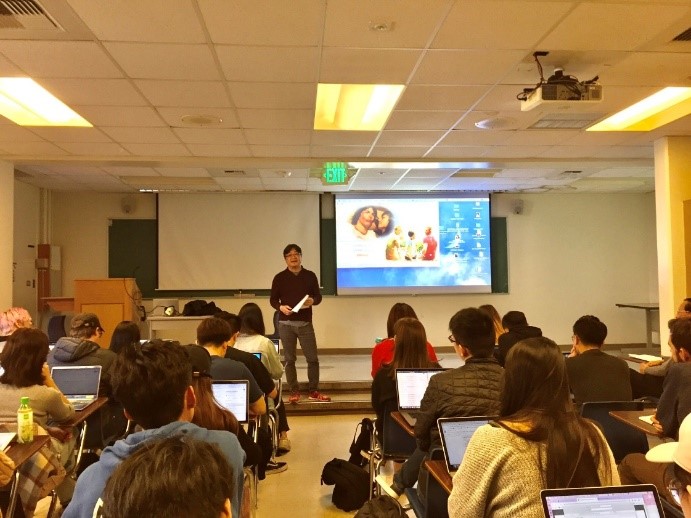Taiwan Studies at the University of California, Santa Barbara
Date:

The Center for Taiwan Studies (CTS) at the University of California, Santa Barbara (UCSB) has strongly promoted the study of Taiwan’s literature, history, society and culture, featuring comparative interdisciplinary approaches. The Center receives support from the Taiwan Studies Project funded by Taiwan’s Ministry of Education, and in 2019, the Ministry of Education extended its collaboration with UCSB, to promote interdisciplinary research and teaching on topics germane to the study of Taiwan for another five-year term.
At the time, Professor Tu Kuo-Ch’ing, a pioneer in the field of Taiwan Studies in the West and the founder and director of the Center said “the Ministry of Education’s support of the Center for Taiwan Studies at UCSB has greatly enriched our curriculum in Taiwan Studies, and allowed the Center to function energetically and play an active role interacting with prominent scholars in the field. It thus helps ensure our status as a vital institution in U.S. academia.”
Professor Tu announced his retirement at the end of winter 2020, after more than 40 years of service to the university and 17 years of service to the Center.
In addition to hosting conferences, publishing Taiwan literature in English translation, and a Taiwan Studies series, and encouraging interdisciplinary Taiwan-related scholarship and campus activities, it offers a range of courses. These include one called Special Topics in Taiwan Studies – Social Science, which has been offered every year since 2013. A range of scholars from different fields in the humanities and social sciences are invited to give lectures on various Taiwan Studies related topics, encompassing historical, economic, political, cultural, and social changes in Taiwan from the period of Japanese rule (1895-1945) to the present.
Forty-nine students enrolled in the course for the 2019–2020 academic year and the Center invited eight experts in their fields to present the lectures listed below, exposing the students to scholarship on a wide array of different aspects of Taiwan Studies. Others could audit the lectures.
• Alenda Chang, from the Department of Film and Media Studies at UCSB: Video Games in Taiwan as Evidence of Cross-Strait Relations.
• Hong Guo-Juin, from the Department of Asian and Middle Eastern Studies and Arts of the Moving Image at Duke University: Murmurs of Youth: Initiation as Historical Retrospection in Taiwan Cinema.
• Cheng Tun-jen, from the Department of Government at the College of William and Mary, gave four lectures on Taiwan politics: 1. Taiwan’s Democratization: How did it Come About? 2. Taiwan’s Political and Economic Development from a Comparative Perspective, 3. Political Discontents in Taiwan and South Kore, and 4. Is Democratization in Taiwan Replicable in China?
• Lingchei Letty Chen, a Modern Chinese Literature scholar in the Department of East Asian Languages and Cultures at Washington University in St. Louis: Remembering China: Taiwan's Anticommunist Literature of the 1950s and 1960s.
• Li Fang-yu, a Chinese Language and Culture scholar from the Division of Humanities at the New College of Florida gave a lecture entitled On Happiness Road: Identity Formation in 21st Century Taiwan.
• Terence Russell, Senior Scholar in the Asian Studies Centre at the University of Manitoba, gave three lectures: 1. Introduction to the Indigenous peoples of Taiwan, 2. Natives and Nationalism in Taiwan, and 3. Indigenous Encounters with the Modern State in Taiwan.
• Yao-Yuan Yeh, an International Studies scholar at the University of St. Thomas:, spoke on Religious and Cultural Foundation of Taiwan: Confucianism, Taoism, Buddhism, and Folk Religions
• Julia Huang, from the Department of Anthropology at DePaul University, gave two lectures: 1. Taiwan Buddhism on the Globe, and 2. Dying to Give: Modern Buddhism and Donation to Science in Taiwan.
The formally enrolled students were required to write a research paper on one of the lecture topics for their final grade. Their papers were on topics in the fields of Taiwan’s economy & politics, Taiwan’s indigenous population, Taiwanese identity and culture, Taiwan’s environment & religions, and Taiwan cinema.
Professor Tu will be greatly missed but he will continue working as an editor of the Taiwan Literature English Translation Series and a member of the Center’s Advisory Board and assist Professor Sabine Frühstück, the Center’s interim Director.